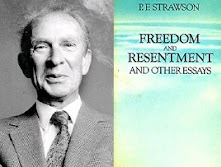In my recent article on the controversy over Fiducia Supplicans, I noted three problems with the document’s qualified permission of blessings for “couples” of a same-sex or other “irregular” kind. First, the document is not consistent with the Vatican’s 2021 statement on the subject, which prohibited such blessings, nor consistent even with itself. Second, its incoherence makes abuses of its permission inevitable, despite the qualifications. Third, the implicature carried by the act of issuing this permission “sends the message” that the Church in some way approves of such couples, even if this message was not intended. In an interview with The Pillar, Cardinal Fernández addresses the controversy, but unfortunately, his remarks exacerbate rather than resolve the problems.
Friday, December 29, 2023
Friday, December 22, 2023
The scandal of Fiducia Supplicans
Sunday, December 17, 2023
The Aristotelian proof on Within Reason
Tuesday, December 12, 2023
On Vallier, Vermeule, and straw men (Updated)
Friday, December 8, 2023
Contra Vallier on integralism
Over at The Josias, I critique Kevin Vallier’s new book All the Kingdoms of the World: On Radical Religious Alternatives to Liberalism.
Sunday, November 26, 2023
Ryle on microphysics and the everyday world
Saturday, November 18, 2023
What is free speech for?
Thursday, November 9, 2023
All One in Christ at Public Discourse
In Feser’s book, Catholics, other
Christians, and even non-Christians will find much to help them confront CRT
and the perennial challenges of living in a racially diverse society…
Critical race theorists routinely use
confusing, tough-to-pin-down logical fallacies. Feser does us the service of laying these
fallacies out methodically and succinctly…
For anyone who knows nothing about CRT, All One in Christ is an excellent place to start. It has a decidedly negative perspective on the movement, but Feser takes pains to be fair to his opponents.
Saturday, November 4, 2023
The Thomist's middle ground in natural theology
Two crucial components of this picture of human knowledge are the theses that concepts are irreducible to sensations and mental images, but can nevertheless be abstracted from imagery by the intellect. As I have discussed before, a key difference between the Aristotelian-Thomistic position on the one hand and early modern forms of rationalism and empiricism on the other is that each of the latter kept one of these Aristotelian-Thomistic theses while rejecting the other. Rationalism maintained the thesis that concepts are irreducible to sensations and mental images, but concluded that many or all concepts therefore could not in any way be derived from them. Hence, rationalists concluded, many or all concepts must be innate. Modern empiricism held on to the thesis that concepts derive from mental imagery, but concluded that they must not really be distinct from them. Hence the modern empiricist tendency toward “imagism,” the view that a concept just is an image (or an image together with a general term).
Tuesday, October 24, 2023
Cartwright on reductionism in science
Reductionism does not have quite the same hold in philosophy of science that it once did, having been subjected to powerful attack not only from Cartwright, but from Paul Feyerabend, John Dupré, and many others. (I discuss the anti-reductionist literature in detail in Aristotle’s Revenge.) Still, the idea that whatever is real is somehow ultimately nothing more than what can in principle be described in the language of a completed physics exerts a powerful hold on many. Cartwright cites James Ladyman and Don Ross as adherents of this view, and Alex Rosenberg is another prominent advocate. As Cartwright notes, in contemporary writing about science, the lure of reductionism is especially evident in discussions of the purported implications of neuroscience for topics like free will.
Thursday, October 12, 2023
Thomism and the Nouvelle Théologie
My review of Jon Kirwan and Matthew Minerd’s important new anthology The Thomistic Response to the Nouvelle Théologie appears in the November 2023 issue of First Things.
Tuesday, October 10, 2023
A little logic is a dangerous thing
A little learning is a dangerous thing;
Drink deep, or taste not the Pierian spring.
There shallow draughts intoxicate the brain,
And drinking largely sobers us again.
Think of the person who has read one book on a subject and suddenly thinks he knows everything. Or the beginning student of philosophy whose superficial encounter with skeptical arguments leads him to deny that we can know anything. A deeper inquiry, if only it were pursued, would in each case yield a more balanced judgement.
Monday, October 2, 2023
Michael F. Flynn (1947-2023)
That Mike will be remembered for his work in science fiction goes without saying. But it is worth emphasizing too that he was an irreplaceable presence in the blogosphere, who showed the potential of the medium for work of substance and lasting value. I doubt he ever posted anything that didn’t reward his readers’ attention, with writing that wore lightly Mike’s learning not only in the sciences but also in philosophy, theology, and history. He was for many years a regular and welcome contributor to the comments section of this blog, raising the tone simply by virtue of his presence. One of the things I most admired about him was the calm and patient manner with which he would respond to even the most obnoxious and ignorant interlocutors. He never had to say that he knew what he was talking about, while his opponent didn’t. He simply showed it by typing up a few sentences.
Wednesday, September 27, 2023
Aquinas on the will’s fixity after death
Aquinas holds that after death, the human soul can no longer change its basic orientation either toward God or away from him. He takes this to be knowable not only from divine revelation but by purely philosophical reasoning. The heart of his position is that the basic orientation of an angelic will is fixed immediately after its creation, and that the human soul after death is relevantly like an angel. This article expounds and defends Aquinas's position, paying special attention to the action theory underlying it.
Tuesday, September 26, 2023
Augustine on false community
Wednesday, September 20, 2023
The Death Penalty and Genesis 9:6: A Reply to Mastnjak (Guest article by Timothy Finlay)
Genesis 9:6 famously states: “Whoever sheds the blood of man, by man shall his blood be shed; for God made man in his own image” (RSV). This has traditionally been understood by Jews and Christians alike as sanctioning capital punishment. In a recent article at Church Life Journal, Nathan Mastnjak has argued on grammatical grounds for an alternative reading of the passage, on which it does not support the death penalty. What follows is a guest article replying to Mastnjak by Timothy Finlay, who is Professor of Biblical Studies at Azusa Pacific University and a member of the National Association of Professors of Hebrew.
In his article, Nathan Mastnjak writes, “The translation ‘by a human shall that person’s blood be shed’ is not strictly impossible, but given the norms of Classical Hebrew grammar, it should be viewed as prima facie unlikely especially since there is a much more plausible translation that is contextually appropriate and grammatically mundane.” This has it completely backward. It is Mastnjak’s claim that the ב in Genesis 9:6 be construed as expressing price or exchange that, while not strictly impossible, flies in the face of Hebrew lexicons and grammars – in contrast to the standard translations (both Jewish and Christian) which are contextually and canonically appropriate and grammatically mundane.
Sunday, September 10, 2023
Hartshorne on the project of natural theology
Process theism denies some of the key attributes ascribed to God by classical theism, such as immutability and impassibility. Charles Hartshorne (1897-2000) was among its chief representatives. As a Thomist, I am the opposite of sympathetic to process theism. However, I’ve always found Hartshorne an interesting thinker. Many twentieth-century philosophers had a regrettable tendency toward overspecialization, and also often ignored all but a handful of thinkers of the past. Hartshorne, by contrast, was a philosopher of the old-fashioned stripe. He addressed a wide variety of philosophical problems, was deeply read in the history of philosophy, and that history informed his work on contemporary issues. He was also old-fashioned insofar as his theism (flawed though it was from my point of view) was integral to his more general metaphysics and ethics. Like the greatest thinkers of the past, Hartshorne knew that the question of God was at the very heart of philosophy, not something that could be ignored by any serious philosopher, or at best tacked on to an otherwise complete system.
Wednesday, August 30, 2023
Fastiggi on Capital Punishment and the Change to the Catechism, Part II
Saturday, August 26, 2023
Fastiggi on Capital Punishment and the Change to the Catechism, Part I
Wednesday, August 23, 2023
Aquinas and Nietzsche on the politics of envy
Monday, August 21, 2023
All One in Christ on EWTN Bookmark
Sunday, August 13, 2023
Haugeland on hylomorphism
Friday, August 4, 2023
Open-minded open thread
Friday, July 28, 2023
Stove and Searle on the rhetorical subversion of common sense
Monday, July 24, 2023
A comment on the Lofton affair
For any readers of my recent reply to Michael Lofton who have not been following events at Twitter and YouTube, Lofton has, over the course of the last few days, posted a series of tweets at the former and a series of videos at the latter strongly taking exception to my article. I have to say that I am mystified at the number and vehemence of these responses. But Lofton seems especially angry about my characterization of his initial video as “defamatory” and “libel.” What follows are some brief remarks that I hope will put his mind at ease and allow us to move on from this affair.
Friday, July 21, 2023
Lofton’s YouTube straw man (Updated)
Wednesday, July 19, 2023
What is classical theism?
Tuesday, July 18, 2023
Archbishop Fernandez’s clarification
Friday, July 14, 2023
Cardinal Newman, Archbishop Fernandez, and the “suspended Magisterium” thesis
The body of the Episcopate was unfaithful to its commission, while the body of the laity was faithful to its baptism… at one time the pope, at other times a patriarchal, metropolitan, or other great see, at other times general councils, said what they should not have said, or did what obscured and compromised revealed truth; while, on the other hand, it was the Christian people, who, under Providence, were the ecclesiastical strength of Athanasius, Hilary, Eusebius of Vercellae, and other great solitary confessors, who would have failed without them.
Friday, July 7, 2023
The vice of insensibility
Wednesday, June 28, 2023
Pilkington responds
Philip Pilkington sent me a response to my reply to his American Postliberal article. I thank him for it and am happy to post it here:
Feser's response to my piece is a welcome effort at clarification. We need such clarification if postliberalism and related thought is to move from the abstract to the concrete. Here I will address the key points, as best I can.
Tuesday, June 27, 2023
Postliberalism, economics, and culture
Tuesday, June 20, 2023
In defense of culture war
Monday, June 12, 2023
The associationist mindset
Friday, June 2, 2023
Reconsidering corporal punishment
Tuesday, May 23, 2023
Hell and conditional prophecy
Wednesday, May 17, 2023
Capital punishment and the law of nations
Monday, May 8, 2023
Substance, teleology, and intentionality
Tuesday, May 2, 2023
A Festschrift for Gyula Klima
Saturday, April 29, 2023
The Catechism and Capital Punishment: A Reply to Annett
Thursday, April 20, 2023
Hazony and Gottfried on wokeism and Marxism
Thursday, April 13, 2023
What is a Law of Nature?
Wednesday, April 12, 2023
All One in Christ on EWTN Live
Thursday, April 6, 2023
Talking philosophy and natural theology
Wednesday, April 5, 2023
Strawson on free will and interpersonal relationships
Saturday, April 1, 2023
All One in Christ on Bookmark Brief
Tuesday, March 28, 2023
McCaig and Reilly on All One in Christ
A devastating critique of CRT and a
clear Catholic response to the evils of racism. A real eye-opener! The incompatibility of CRT with the Faith, its
numerous logical errors, and it’s deeper entrenching of racism into societal
fabric could not be clearer. Please read.
In the
Winter issue of the Claremont Review of
Books, Robert R. Reilly kindly reviews
the book. From the review:
Feser’s [book] is an important rejoinder, delivered in an accessible way for a wide audience, not just specialists and Catholics…


















































